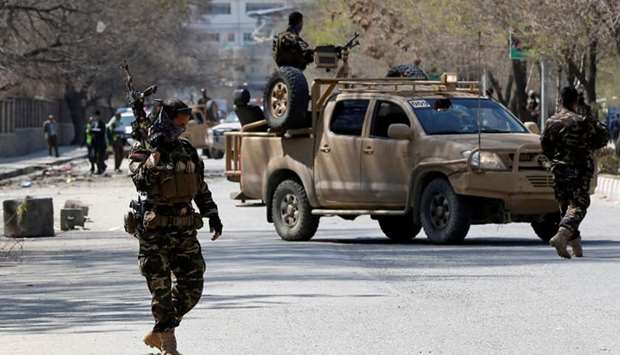* Attack on holiday to mark Persian new year
* Islamic State claims responsibility
* Some Muslims view Nawruz festival as un-Islamic
The explosion underlined the threat to the city from militant attacks, despite government promises to tighten security in the wake of an attack in central Kabul that killed around 100 people in January.
Militant group Islamic State, which has claimed several previous attacks on Shia targets, claimed responsibility, saying the attack specifically targeted Shias celebrating Nawruz, its Amaq news agency said.
The Taliban, which often fights Islamic State's local affiliate in Afghanistan, issued a statement denying any connection to the blast.
Kabul had been on alert for attacks over the Nawruz holiday but the bomber was still able to detonate his explosives as people were leaving the Kart-e Sakhi shrine, in a heavily Shia area in the west of the city.
"People were heading home joyously after the end of the ceremony when the suicide bomber detonated his explosives among them," said Kabul police chief Daud Amin. "Many of our countrymen were martyred."
Interior Ministry spokesman Najib Danesh said the bomber had apparently intended to reach the shrine, which was attacked during a Shia festival in October 2016, but had been prevented from getting closer by police checkpoints.
"We had our security in place in and around the shrine," he said. "All the casualties were young people who were either passing by on the road or gathering to enjoy Nawruz."
"Un-Islamic" festival
Nawruz, an ancient Persian festival to mark the start of spring, is widely celebrated in many parts of Afghanistan but has also faced opposition from some fundamentalist Muslims, who say it is un-Islamic.
Waheed Majroh, a spokesman for the ministry of public health, said 32 people were confirmed dead with more than 50 wounded being treated in hospitals in the city. Women and children were among the casualties, he said.
Wednesday's attack was the latest in a series to have struck Kabul this year, including one earlier this month that targeted the mainly Shia Hazara minority.
The seemingly endless attacks have undermined support for the government of President Ashraf Ghani, who offered last month to hold peace talks with Taliban insurgents fighting to drive out international forces and reimpose their version of strict Islamic law.
The Taliban have so far shown little sign of accepting the offer of talks with the Western-backed government, which they consider an illegitimate, foreign-imposed regime, although they have offered to talk to the United States.

